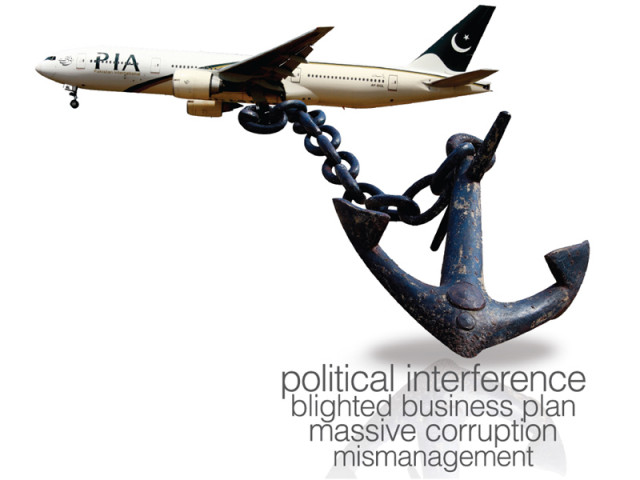Dragged down: PIA needs to jettison its past to prepare for a better future
There is no one-stop solution to the woes of Pakistan’s loss-making flag carrier.

The only way the Turkish Airlines-PIA alliance could have worked to increase passenger numbers would have been to cut prices and become a low-cost option. CREATIVE COMMONS
As a state-owned and managed enterprise, Pakistan International Airlines’ (PIA) fortunes have been dwindling for over a decade. Now saddled with massive amounts of debt and ever expanding losses, PIA needs to change drastically.
However, reform in itself is very difficult. And we, as citizens and consumers of PIA, have not helped make things any better. Too much national pride is invested in PIA. Open any article or editorial on PIA, and it starts off by listing its achievements from 30 or so years ago.
The past was the past. The world was different then. Jet fuel was cheaper, PIA faced less competition abroad, and enjoyed a monopoly over domestic flights. Comparing PIA today with what it was is an unfair comparison and sets unrealistic expectations on whoever attempts organisational reform.
Unrealistic expectations
Talking of unrealistic expectations, many of us have fallen into the trap of comparing PIA with Middle Eastern airlines such as Emirates, Qatar Airways and Etihad, etc. These are profitable to an extent, and provide excellent service. However, this comparison is unfair, as these airlines enjoy tacit state backing, lower operating costs due to state-financed infrastructure development such as airports and support facilities, and relatively lower labour costs, especially amongst lower-skilled airport, janitorial and support staff based on migrant labour.
Further afield, the airline market looks quite grim. Traditional European carriers are struggling, and several budget airlines have shut down. Cathay Pacific, Qantas, JAL and Singapore Airlines have all experienced persistent losses over the past decade for one reason or the other. Mainly, the impact of higher oil prices, aviation and carbon taxes, coupled with increased competition and rising airport charges, has shrunk profit margins across the globe.
Challenging regional dominance?
PIA is poorly-equipped to contest the dominance of Gulf airlines. A major source of revenue is the Indian market and the massive economies of scales enjoyed by flights in and out of India. Pakistan, however, is excluded from the Indian market. Which is a shame, as PIA could have become a low-cost alternative: bringing customers from Europe, who would have transited in Karachi for onward flights to Mumbai. However, such ventures remain a pipe dream.
To sell and move on?
Privatisation is consistently offered as a solution. Then again, as a ‘strategic asset’ this is unlikely to happen. They are too many rent-seekers attached to the organisation that will allow this gravy train to be privatised. There is the option of a partnership or a management buyout, but that is unlikely to happen.
Given the state of the global airline market, PIA is unlikely to attract buyers. Pakistan itself is not an attractive market in terms of relocating overseas senior managers. Does the PIA brand have any value that could attract a potential buyer? Debatable! Who would want to buy into an organisation with strong labour unions whose demands are unlikely to be met by the state and so will pass on to any potential private buyer? Who would buy into that?
Karachi as a hub
A year or so ago the ‘Turkish dream’ filled papers as a possible way to ‘save’ PIA. Turkish Airlines, with which PIA already has a code-sharing agreement, would have taken over some of PIA’s routes, while PIA would have taken over some eastbound Turkish Airline routes.
The only way the Turkish Airlines-PIA alliance could have worked to increase passenger numbers would have been to cut prices and become a low-cost option. However, Kuwait Airways has been trying to do just that, yet it remains a loss making entity.
A magic solution?
Sadly there isn’t one. While the factors above paint a dismal picture, we will have to accept that expecting some sort of ‘big bang’ reform package is not going to fix PIA. Change is likely to be slow and incremental. Efforts to cut costs, such as discontinuing hot meals on domestic flights, will help lower running costs. The elephant in the room remains the high employee to aircraft ratio: how PIA or the government aims to tackle special interest groups going forward remains a mystery.
As a service provider, quality, punctuality, consistency and safety all contribute towards offering a product consumers would happily pay and consistently opt for. However, headlines on how an aircraft landed in Lahore unannounced to pick up the daughter of the plane’s captain do not inspire much confidence.
It remains to be seen where this plane is headed.
The writer completed his masters in global politics from the London School of Economics and is currently teaching Economics at Bellerbys College, London.
Published in The Express Tribune, March 11th, 2013.
Like Business on Facebook to stay informed and join in the conversation.



















COMMENTS
Comments are moderated and generally will be posted if they are on-topic and not abusive.
For more information, please see our Comments FAQ